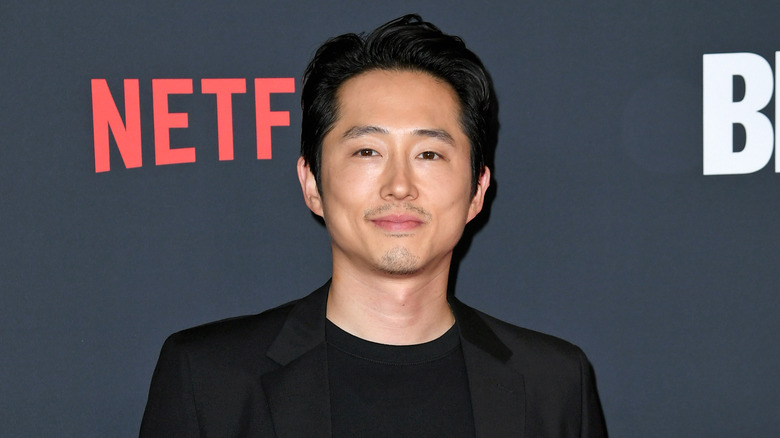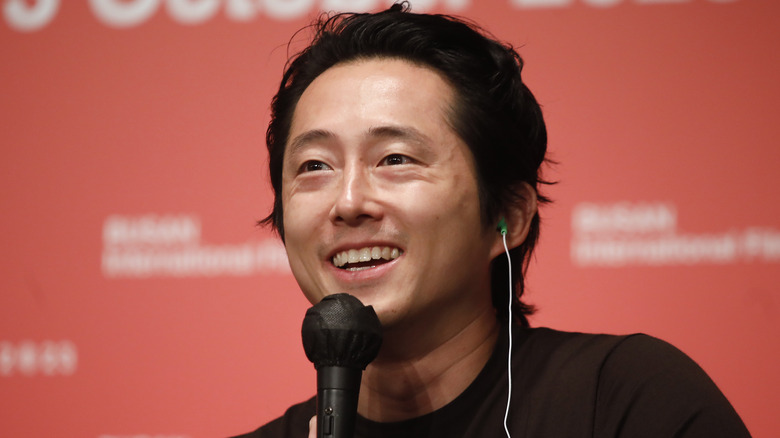The Sentry's Race Is Crucial - But Not For The Reasons MCU Critics Think
All eyes are on "Thunderbolts," which is set to bring a variety of the Marvel Cinematic Universe's anti-heroes and villains together for a covert mission that could have drastic ramifications for the franchise. While concrete plot details for the Jake Schreier-directed picture are slim, we know that the film will introduce Sentry, one of the more complicated heroes in the Marvel mythos. An extremely powerful hero in Marvel Comics, Sentry first debuted in 2000. Sentry boasts the ability to teleport, fly, and project energy blasts, but suffers from severe amnesia. Introduced as the mild-mannered Bob Reynolds, the middle-aged man learns that he's Sentry, a powerful but largely forgotten superhero. While he's crossed paths with dozens of heroes and made a genuine impact, no one remembers him, which makes Sentry's inner conflict all the more powerful. In the comics, Reynolds is depicted as a Caucasian male, but in "Thunderbolts," Sentry will likely be portrayed by Korean-born American actor Steven Yeun.
Following Robert Kirkman's statements that Yeun is allegedly on track to play Sentry, Marvel's worst critics came out to criticize the casting decision, which bends the historically white character's race. But by casting Yeun, Marvel could take Sentry in an interesting and inspired direction, where the character's race can directly come into conversation with his central conflict, which is facing erasure.
While Hollywood attempts to make strides in terms of representation, Asians continue to have their stories diminished or stereotyped. Within the context of Yeun's race, Sentry's erasure can acknowledge, in a metatextual way, how Asians have little blockbuster presence. Seeing as Sentry's inherent whiteness isn't a central part of his character, Yeun has an opportunity to breathe new life into the hero, by marrying Sentry's internal conflicts with the weight of expectations that come with being an Asian-American icon.
How Sentry's elimination has real-life roots
Sentry is as powerful as the likes of Thor or Hulk, but what's most interesting about him is how he's largely forgotten by both his fellow heroes and the larger world. Even Bob Reynolds himself doesn't remember his exploits as the powerful yellow-and-blue-costumed hero. It's later learned that Sentry was made to be forgotten so his archnemesis, The Void, could also be erased. The terrifying Void is Reynolds' second half, who responds to Sentry's positive actions with equally negative decisions. By erasing Sentry from everyone's memory, The Void can be eliminated, but at the cost of Reynolds' recognition and clout.
While it's unclear how "Thunderbolts" will tackle this unique conflict, it's expected that Reynolds' erasure will be at the heart of the character. After all, it would be moot to introduce Sentry without having the character deal with how he's not really a part of the MCU, despite having always been there. A 2021 study from the Pew Research Centre reveals that Asians make up 7% of the American population, a number that continues to increase. Despite being a key part of the population, Asians aren't represented well on screen according to a 2021 study from USC Annenberg Inclusion Initiative (via The Hill). Just 5.9% of over 51,000 speaking roles were given to the Asian and Pacific Islander (API) community — that's a stunning lack of representation. And when those characters are on screen, they're "silenced, stereotyped, tokenized [and/or] isolated."
That study highlights just how invisible Asians are on screen — a sentiment that Sentry can literally relate to, as the world doesn't know who he is, despite how much the hero has done to help everyone.
How Marvel can tackle Steven Yeun's casting
It's anyone's guess just how "Thunderbolts" could introduce Sentry, but it'll speak volumes to see an Asian-American hero at the forefront of several iconic MCU moments. It wouldn't be surprising to have the all-powerful hero right there during the Battle of New York in the first "Avengers" or in the final showdown with Thanos ("Endgame"). In the comics, Sentry is a fixture who has always been a part of the action, but he's never treated with the same reverence as the likes of Thor or Captain America. Couple this erasure with how there are little to no Asian heroes in the MCU and suddenly, Sentry's race becomes crucial. Yes, there's Simu Liu's Shang-Chi, but that's one character in a sea of a dozen white heroes.
Having Sentry portrayed by one of the most prominent working Asian actors today will no doubt be a watershed moment for representation in both American blockbusters and the MCU. It'll also be a moment of self-reflection for Marvel Studios and the larger blockbuster machine as a whole. With API representation at less than 6%, it's rare to see story-defining characters populated by these actors. It's a meta way for the MCU to tackle this ongoing conversation about diversity by having an Asian hero who hasn't been acknowledged and praised for his efforts in the past.
Having Marvel confront this sentiment in a self-aware (and hopefully apologetic manner) is far more productive than throwing in an Asian character for the sake of boosting diversity. Marvel Studios has previously erased Asian characters in the past, like the Ancient One, who was portrayed by Caucasian actor Tilda Swinton. Now, the studio has an opportunity to acknowledge its missteps while also making Sentry a far more interesting character.
Steven Yeun as Sentry is a step in the right direction
Sentry is no doubt a complicated hero, even without his race factoring into his portrayal. He is a deeply tortured superstar who constantly has to battle between recognition and his duties as a hero, realizing it's best to be forgotten for the greater good. This is the type of character that Asians in Hollywood simply don't get to play. Historically speaking, Asians are often sidelined in Hollywood productions, given minor or inconsequential roles. And, for a staggeringly long period, the act of yellowface was a prevalent Hollywood trend.
If "Shang-Chi" was a step in the right direction, then Sentry looks to be a commitment to giving Asian actors more consequential and impactful roles in the MCU. If anything, this is exactly what Steven Yeun is doing with his acting career. The Oscar nominee's CV has been padded with brilliant appearances in projects like "Beef" and "Minari," which expertly seek to tackle and dismantle established stereotypes surrounding Asian people and communities. Asian actors are often given stereotypical roles that invalidate or mischaracterize cultural norms, so it will be interesting to see just how prominent of a role Sentry's race plays in "Thunderbolts."
Because the comic version of Sentry isn't dependent on his inherent whiteness, it's great if Marvel gives such an exciting role to an actor from a different race. This is a step in the right direction. A 2023 study from Luminate (via NBC News) says that Asian representation is continuing to grow, with cinematic prominence increasing from 5.9% to 7.7%. Clearly, efforts are being made, and by having an Asian Sentry, Marvel should be able to explore the character in a unique way that expands his mythos and impact.



